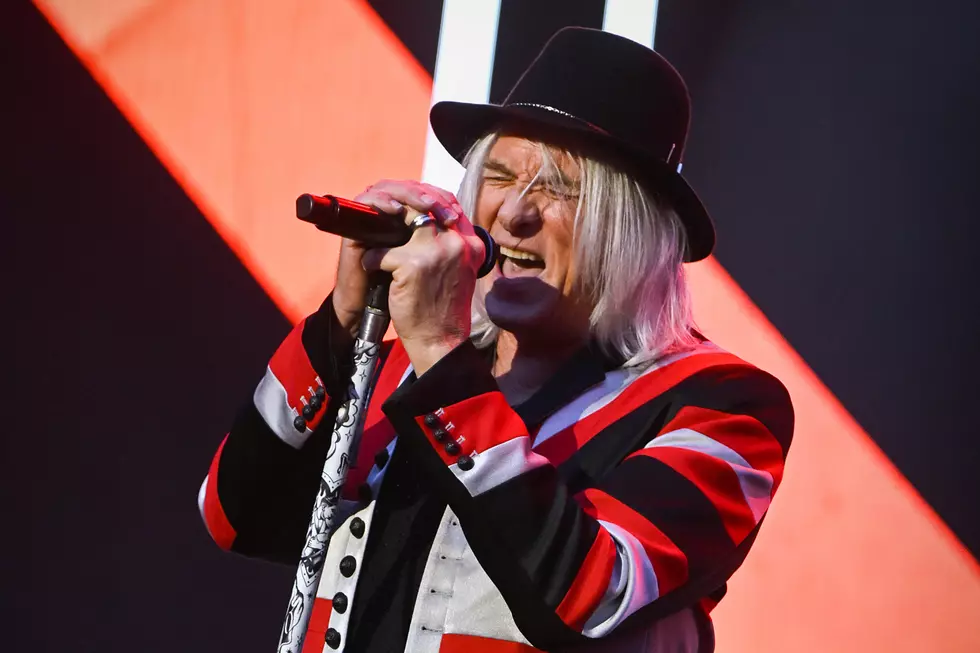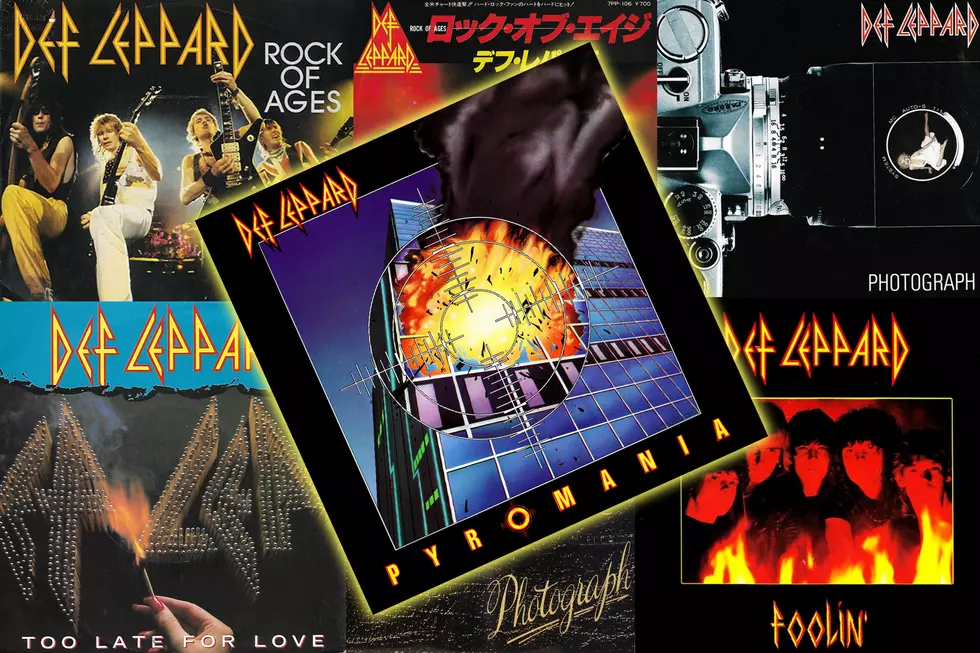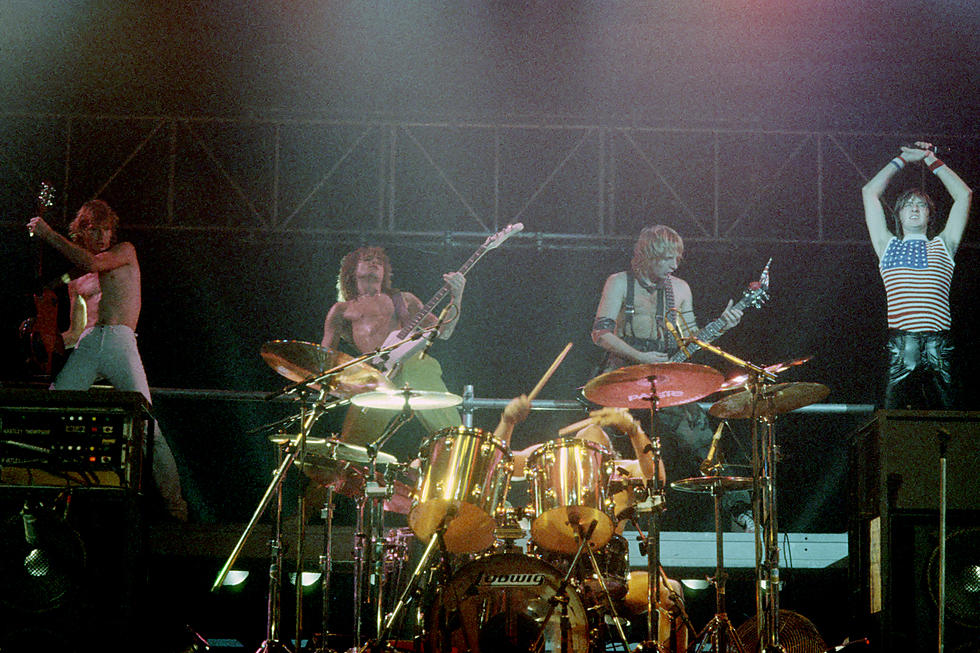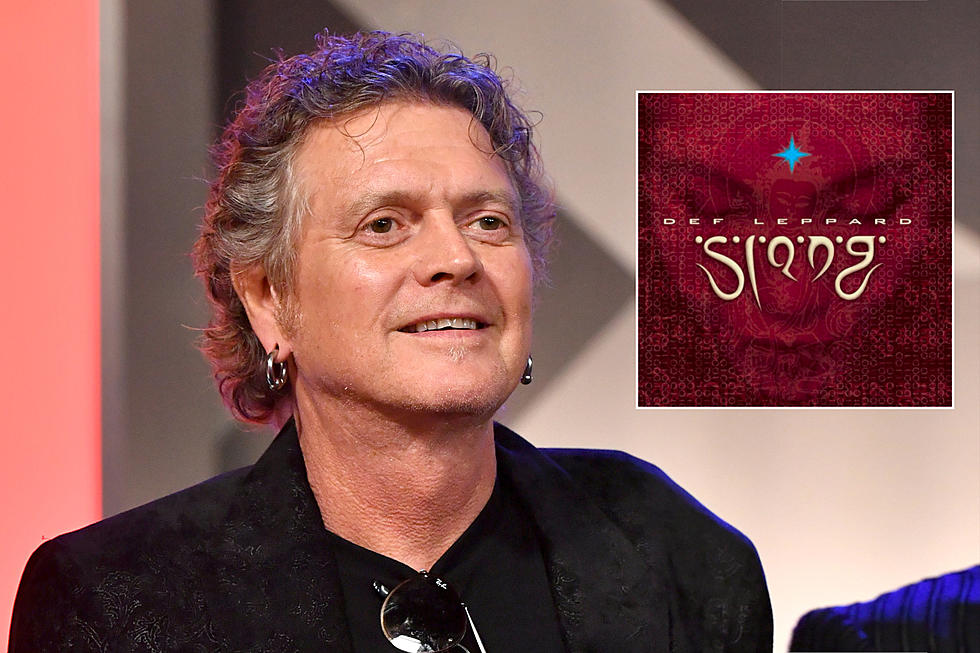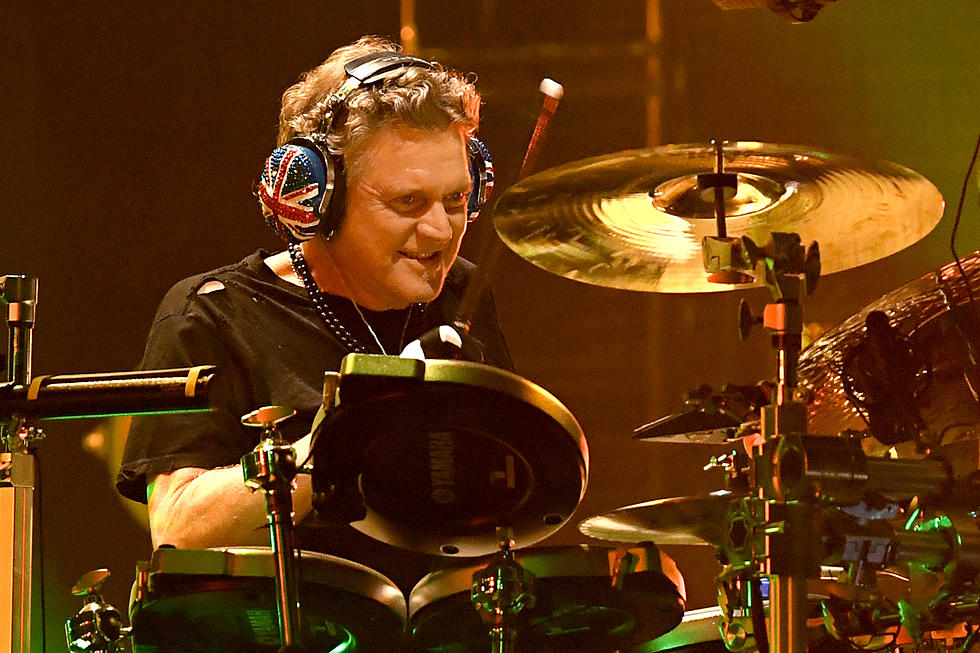
Exclusive Interview: Phil Collen on Manraze and Def Leppard Legacy
Guitarist Phil Collen is a busy man this year: Def Leppard recently released their first official live album and are touring this summer with Heart. Separately, Collen is preparing to release 'punkfunkrootsrock,' the second album from his band Manraze on Aug. 2, a collaboration with former Girl bandmate Simon Laffy and Sex Pistols drummer Paul Cook.
Drawing inspiration from the great power trios across time, from Cream to Nirvana, Manraze features some of the heaviest riffs that Collen has laid down on record in a long time, particularly on the album's first single, 'Over My Dead Body,' but it also features moments of reggae, blues and punk, all sewn together with impressively diverse vocals from Collen.
We spent a few moments talking with Phil about the new Manraze album, the latest release from Def Leppard and his thoughts on Def Lep's overall legacy.
Well, I want to dig into the Manraze stuff – the band is finally playing its first U.S. show [which was originally set for July 31 and now has been rescheduled for Oct. 2, due to show cancellations on the current Def Leppard tour], which is a great opportunity to set up the new album. You've played some dates overseas ... what took so long to bring it here to the States?
With Def Leppard, they go: why don't you come to Colombia, why don't you come to Lithuania. You've got to be invited there, you can't just show up. It's really that, really – if we'd have come, it would have just been for no reason, there would have been no promotion, no nothing, so you've always got to tie it in with something else. Now we've got this new release with Rocket Science, a record label, so that makes all of the difference, really, with the marketing, interviews and all of that stuff, so it makes it valid and worthwhile coming, otherwise there's no point at all.
I love the different vocal stylings that we hear from you on this album. 'Over My Dead Body' has a glammy Alice Cooper kind of scuzziness to the vocals at certain points and then when you get to the second track 'I C U In Everything,' things shift to an almost Type O Negative feel.
You know, it's really weird that you say that. My son said “this sounds like a cross between Type O Negative” and I forget what the other band was, but yeah, he mentioned that. Again, it's all of the different influences, they come out. Plus, I've been singing for years – the great thing about it is that, as with guitar, you can express it anyway you feel because like I said, I've been doing it for years. All of those years with Mutt Lange and learning how to sing and not even thinking about it, really. So, it's kind of cool when you do an album or a song and you can just go in any direction you like, it's pretty cool.
Tracking through the album for the first time, I didn't have a track listing and I heard a Hendrix-like vibe to 'All I Wanna Do' and later, an actual Hendrix cover of the song 'Fire.' Out of all of the Hendrix songs you could have done, how did you end up doing that one?
For some reason, we've been playing that song live ever since we started rehearsing. I think one of the things that we discovered and this is really weird, since we've been playing for years, all of us. But in a three piece format, we did start listening to a lot of the other great three pieces like the Police, Hendrix, Nirvana and a lot of that stuff ended up coming out in the music.
So early on, we just threw in 'Fire,' because I always really wanted to do this song at some point and it just clicked. It was just like wow, this is great, especially the three piece thing. There's a couple of songs that we've never done the same twice – they go off on little tangents and they end differently and it's great, there's so much freedom involved.
'Over My Dead Body,' the background vocals on that one are a slight hint that there's a Def Leppard connection, but really, only because I'm a fan of your past stuff, because I think that overall, to virgin ears, it sounds as current as anything else on the radio.
Initially, that was the funny thing, because I write a lot of Def Leppard stuff, so when we started writing the songs for Manraze, the guys would go 'well this harmony thing sounds too much like your other band.' So, we've actually been making a conscious effort to avoid that stuff. In the end, some of the songs, we wouldn't have backing vocals, they'd just be an enhanced lead vocal or something. That was interesting that we went there and then kind of changed it because some of the songs on the first album would have sounded too much like a Def Leppard song if we'd have just gone with the original idea, so we actually consciously made an effort to make it a little bit different.
I looked at it as not so much the stylings of Def Leppard, but really, you employing some of the things that you've learned from being in the studio with Def Leppard over the years. There are some stacked background vocals on this album, but it's certainly not as built up as what you've done with Def Leppard.
Definitely. It would be like four tracks of vocals as opposed to with Def Leppard, we'd do sixteen on the harmony and then wind up doing each others harmonies, so you'd get really stacked vocals. It's part of the [Def Leppard] sound. In Def Leppard, we actually used that as an instrument. Again, very interestingly, we haven't got away at that extra instrument, so it allows you to be more spontaneous, I think.
Shifting directions, I want to go back and talk about the point when you joined Def Leppard. You came into the band at a time just before they really started to make some noise with 'Pyromania.' What was your awareness of the band prior to joining and what sort of expectations did you really have, going into the experience?
Well, I knew the guys. I'd seen them play and I'd actually jammed with them a few times onstage and hung out. I thought they were trying to do something different. We're all from England and came in the middle of all of this New Wave of British Heavy Metal thing which was basically working class kids that were doing something a little bit like Motorhead, that kind of approach.
Where Def Leppard, they looked different and they were trying to write commercial songs in that format. 'High 'n' Dry' had got there a little bit – it was a little bit AC/DC – 'Bringin' on the Heartbreak' reminded me of 'Dream On' by Aerosmith, It just showed potential to open up into something a lot bigger and the band was still trying to find their niche. I think with 'Pyromania' with Mutt Lange, we were still trying to hammer that thing home where it sounded like Queen crossed with AC/DC but it was something else. That's really kind of what I heard, was that. It was still looking for its sound. I think we only really hit on it on 'Hysteria,' to be quite honest.
But with 'Pyromania,' it was definitely very different, it was a collage or a hybrid of a lot of rock stuff that I'd loved and been listening to for years. And I thought, being a hybrid is great. It's being brave and saying “I'm not just going to stick in my little box in that little genre, I'm actually going to expand my horizons. I think any band who does that is great.
Again, a lot of people miss the point in bands, they go “well, this guy's a great musician” and it's so unimportant. The important thing is that everyone's on the same page and you have a dream or a concept that you want to fulfill. I think Def Leppard when I joined, it was still on that upward trend of what it was supposed to be like.
So, it was a very exciting period for any band, especially when you look back and you look at bands like the Police, same deal, they put the first album out and then you listen to 'Synchronicity' at the end and the songwriting was just off the hook, it was just amazing. And that's what you get, you discover about yourself and your band, your restrictions and your strengths and everything, it's really cool. It makes it exciting being in the band.
When you hear today's bands, what kind of legacy stamp can you hear that has transferred from Def Leppard's music to the music of today?
When anyone has a big album, everyone copies it, whether it's Nirvana, Def Leppard, Lady Gaga, everyone absolutely copies it. Everyone's still copying Britney Spears, it's really interesting. She actually started a huge trend and they're still trying to do this. I listen to the L.A. radio stations and there's all these girls singing about being a bad girl and all this stuff and it all wants to be Britney. It's very interesting.
With Def Leppard, I definitely heard the vocal thing and I'd hear Boyz II Men, they had some stuff that I'd go, wow that's exactly the same as us -- they've copied the stacking, actually where you put the vocals. And you know, even that wasn't a new thing, because a lot of bands would do that in the '50s and '60s, but we just took it to a different level with the amount of vocals you put in there. So, it was mainly that and guitar licks, my guitar, that signature kind of muted guitar thing that's a melodic rhythmic thing.
I kind of borrowed it off Eddie Van Halen but just pushed it to a different bracket with that as well and you'd make it melodic and put it in songs like 'Animal' and 'Love Bites,' stuff like that. So, you'd hear other bands doing all of that stuff, but mainly the vocal thing I think and obviously the snare drum thing. It would just come to affect a whole generation, certainly of rock bands, but also pop and R&B really.
There's a new Def Leppard live album out with a few new studio tracks on it previewing a new album. From your part, how would you describe the new album that Def Leppard is currently working on, as far as how it's shaping up sound wise?
I don't think we are going to do a new record per-say. Not like a standard thing, because it would take a year to fit in the studio. I really love the fact that we've done three songs, I think it reminded me of all of the Beatles stuff, all the Stones stuff, David Bowie, they'd go in the studio and they would write when they were inspired and they would record when they were inspired. As opposed to going “we've got to go in the studio, we've got three good tracks and we've got like seven fillers.”
I don't like the idea of that. I thought what was really refreshing about the three new songs is that they evolved naturally. They were written and recorded and then we got the opportunity to release them on a live album and I love that. I thought “wow, that's way more inspired and it's going to sound a lot more real than anything we've done for many years, actually.”
So, I don't know, I think perhaps we should doing something like that where it's not a full blown album per-say, but it's like an E.P. Or something where you just release certain songs. I think that'd be the way to go. I think the three songs, are very representative of us right now. But say in a year's time, I think it could be different again. Since we've done those three, I've finished the Manraze album, Joe's done some Down 'n' Outz stuff, so already it's shifted a little bit, dynamic wise and energy wise. So, you have to bear all of that in mind, I think that what we do from this point on would be different to the three songs, which is a very interesting thing when you look at it.
You played guitar on Sam Kinison's 'Wild Thing.' Do you have a good Sam story?
[Laughs] It was pretty wild, actually, he was crazy, obviously. I remember him coming into the studio just screaming. That was his whole thing, shouting, screaming and stuff. Rudy Sarzo had called me up and said, “Hey, can you come play guitar on this Sam Kinison thing.” He was just crazy, funny as hell and super-crazy, just like he was in the videos and all of the TV appearances. But no really crazy thing, not that I can dig into right now.
It sounds like you escaped relatively unscathed then.
Oh, big time, totally. Yeah!
Watch Manraze Talk About Their New Album
More From Ultimate Classic Rock
